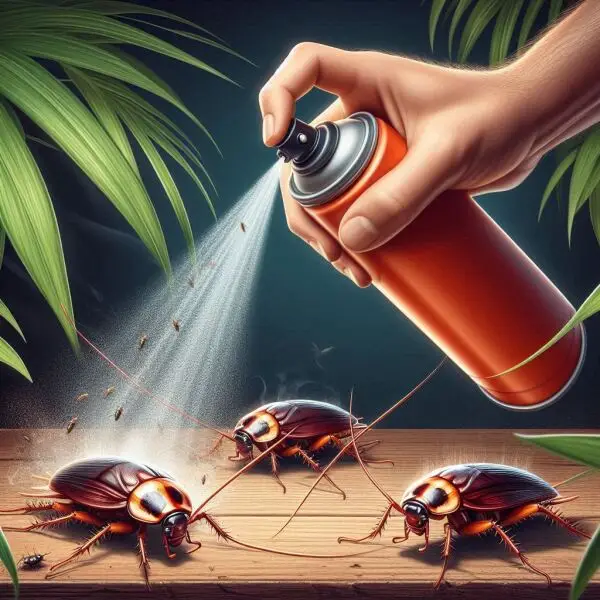Why do aerosol insecticides fail against cockroaches?
Aerosol insecticides do not eliminate all cockroaches, especially German ones. Scientists from Kentucky and Auburn emphasize the need for new control strategies....
Table of Contents
- The Ineffectiveness of Common Insecticides
- Pyrethroid Resistance
- Factors Affecting the Effectiveness of Insecticides
- New Strategies for Pest Control
Follow Patricia Alegsa on Pinterest!
The Ineffectiveness of Common Insecticides
Common aerosol insecticides, widely available on the market for pest control, have proven to be ineffective at eliminating cockroaches in domestic settings, according to research conducted by scientists from the University of Kentucky and Auburn University.
These experts have questioned the usefulness of these products, describing them as of “little or no value” in the fight against German cockroach infestations (Blattella germanica), one of the most problematic species in homes and buildings around the world.
Laboratory tests revealed that residual insecticides, designed to be applied to surfaces where cockroaches are likely to appear, have minimal impact on their population.
Laboratory tests revealed that residual insecticides, designed to be applied to surfaces where cockroaches are likely to appear, have minimal impact on their population.
In fact, aerosols and liquids containing pyrethroid insecticides manage to kill less than 20% of cockroaches exposed to treated surfaces. This low effectiveness highlights the urgent need to develop new strategies for effective control of these pests.
One of the critical factors identified in the research is the resistance of German cockroaches to pyrethroid insecticides.
Pyrethroid Resistance
One of the critical factors identified in the research is the resistance of German cockroaches to pyrethroid insecticides.
Previous studies had already indicated that this species has developed a remarkable resistance to these compounds, making their eradication through conventional methods difficult.
Johnalyn Gordon, the lead author of the study, emphasizes that many cockroaches within households have some degree of resistance to these products.
“As far as we know, there has not been a documented population of German cockroaches susceptible to pyrethroids in decades,” says Gordon, highlighting the need to reconsider current pest control strategies.
Researchers also noted that the type of surface where insecticides are applied can influence their effectiveness.
Factors Affecting the Effectiveness of Insecticides
Researchers also noted that the type of surface where insecticides are applied can influence their effectiveness.
For example, it was found that drywall performs worse compared to surfaces like ceramic tiles and stainless steel.
Additionally, the behavior of cockroaches, which tend to avoid treated areas, also reduces exposure to insecticides.
A recent independent study corroborated that resistant German cockroaches avoid prolonged contact with treated surfaces, which accentuates the difficulty of controlling them with conventional methods.
New Strategies for Pest Control
Given the ineffectiveness of common insecticides, experts suggest considering more effective alternatives, such as gel or liquid baits that attract cockroaches to a food source laced with a slow-acting insecticide.
Additionally, the importance of accessing professional pest control services that implement an integrated pest management (IPM) approach, which combines different methods for more effective management, is emphasized.
However, it is acknowledged that these services are not always accessible or affordable, especially in low-income areas where cockroach infestations are common.
The research highlights the need to innovate in the development of new technologies and strategies that close management gaps and provide effective and accessible pest control solutions across all sectors of society.
Creating new active ingredients and modes of action could be key to effectively addressing this issue.
Subscribe to the free weekly horoscope
Aquarius Aries Cancer Capricorn Gemini Leo Libra Pisces Sagittarius Scorpio Taurus Virgo
-
 Why is it so difficult to lose abdominal fat?
Why is it so difficult to lose abdominal fat?
I give you some tips that will help you lose abdominal fat and show a better figure. -
 5 reasons to include pistachios in your diet
5 reasons to include pistachios in your diet
Discover why pistachios are winning over taste buds: irresistible flavor, rich in nutrients, heart allies, satisfying, and perfect for any occasion. -
 5 Secrets of Lindsay Lohan for Her Skin to Shine Like This!
5 Secrets of Lindsay Lohan for Her Skin to Shine Like This!
Lindsay Lohan, at 38 years old, shines with renewed skin thanks to laser treatments, hydration, and hair care. Get inspired by her resurgence with these basic beauty tips. -
 The 5 best infusions for sleeping: proven by science
The 5 best infusions for sleeping: proven by science
Do you have trouble sleeping? Discover the best natural infusions, from relaxing chamomile to magical valerian, to achieve nights of deep rest and wake up full of energy. Say goodbye to insomnia with these drinks! -
 Looks naked!: the Olympic swimmer's swimsuit that's causing a stir
Looks naked!: the Olympic swimmer's swimsuit that's causing a stir
Arno Kamminga and his famous swimsuit at the 2024 Olympic Games!
I am Patricia Alegsa
I have been writing horoscope and self-help articles professionally for over 20 years.
Subscribe to the free weekly horoscope
Receive weekly in your email the horoscope and our new articles on love, family, work, dreams and more news. We do NOT send spam.
Astral and numerological analysis
-
 Discover your future, secret personality traits and how to improve in love, business and life in general
Discover your future, secret personality traits and how to improve in love, business and life in general
-
 Online Dream Interpreter: with artificial intelligence
Do you want to know what a dream you had means? Discover the power of understanding your dreams with our advanced online dream interpreter using artificial intelligence that responds to you in seconds.
Online Dream Interpreter: with artificial intelligence
Do you want to know what a dream you had means? Discover the power of understanding your dreams with our advanced online dream interpreter using artificial intelligence that responds to you in seconds.
-
 How to lose weight with the Mediterranean diet? Experts answer your questions
How to lose weight with the Mediterranean diet? Experts answer your questions
Discover how the Mediterranean diet can help you lose weight and improve your health. -
 Dopamine detox? Viral myth or fad without science behind it, according to experts
Dopamine detox? Viral myth or fad without science behind it, according to experts
Dopamine detox: modern miracle or pure fiction? Social media loves it, but experts dismiss it and recommend science-backed methods. -
 Extreme Allergy: A woman is allergic to everything, including her own husband
Extreme Allergy: A woman is allergic to everything, including her own husband
Discover the inspiring story of Johanna Watkins, who faces extreme allergies and a limited diet, while her husband Scott lovingly cares for her. -
 The ideal diet after 40 years: keys for muscle, energy, and a healthy mind
The ideal diet after 40 years: keys for muscle, energy, and a healthy mind
Discover what to eat after 40: key foods to strengthen muscles, energy, and mind, according to health and nutrition experts. -
 The 'shower effect': the key to brilliant ideas and problem-solving
The 'shower effect': the key to brilliant ideas and problem-solving
Discover the 'shower effect': how passive activities like walking the dog spark brilliant ideas and boost your creativity. Use this to solve problems! -
 Chia Seeds: Who Should Avoid Their Consumption?
Chia Seeds: Who Should Avoid Their Consumption?
Discover who should avoid chia seeds and why. Learn about their contraindications and the recommended daily portion to enjoy their benefits. -
 Ralph Macchio at 62: How does he manage to stay so young?
Ralph Macchio at 62: How does he manage to stay so young?
At 62, Ralph Macchio, star of Karate Kid and Cobra Kai, surprises with his youthful appearance. Discover his secret and his family legacy! -
 7 Steps to Make New Friends and Strengthen Old Ones
7 Steps to Make New Friends and Strengthen Old Ones
Discover the key to being happier and healthier: surround yourself with people. Learn how to maintain and nurture friendships, as well as meet new and exciting connections in your life. -
 The citrus fruit that combats insomnia and improves your sleep
The citrus fruit that combats insomnia and improves your sleep
Discover the citrus fruit that combats insomnia with its sedative properties. Improve your sleep, reduce stress, and provide essential vitamins. -
 Live to be 120 years old: how to achieve it without spending millions
Live to be 120 years old: how to achieve it without spending millions
Millionaire Bryan Johnson spends 2 million dollars a year on his health to live up to 120 years old. I will show you what he does and how you can do it for much less money. -
 Anxiety in the 12 Zodiac Signs: The Hidden Message and How to Relieve It
Anxiety in the 12 Zodiac Signs: The Hidden Message and How to Relieve It
Discover how each of the 12 signs experiences anxiety and what to do to relieve it with simple practices, affirmations, and daily habits. -
 Include dates in your diet to improve your digestion and control glucose
Include dates in your diet to improve your digestion and control glucose
Discover these fiber-rich fruits that improve digestion and control glucose. They provide natural energy, but consume in moderation due to their sugar! -
 What does it mean to dream of scissors?
What does it mean to dream of scissors?
Discover the meaning of your dreams with scissors and how they can influence your life. Learn tips to make important decisions and achieve your goals.